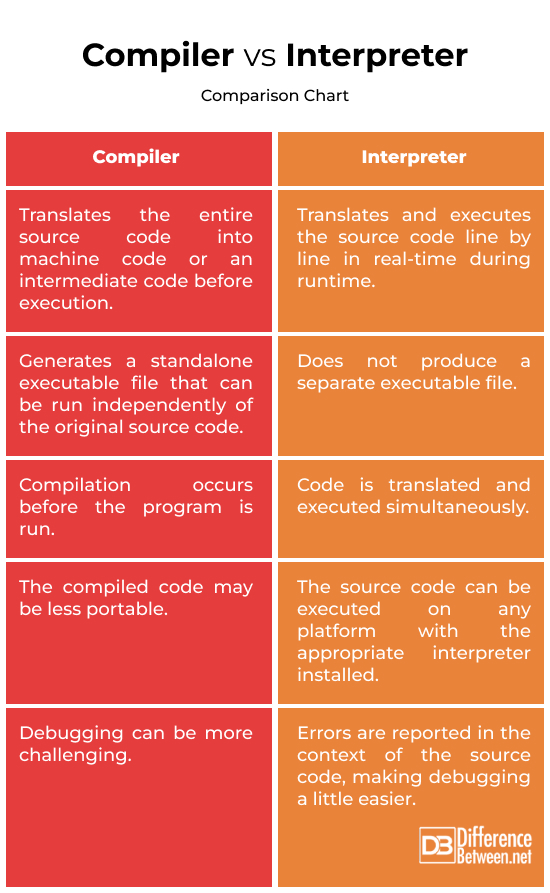Difference Between Compiler and Interpreter
The programs known as compilers and interpreters are responsible for converting high-level programming code into a format that computers are able to comprehend and carry out by themselves. In spite of the fact that they accomplish the same overarching goal, they do it in distinctive ways. Let’s have a look at some of the most important distinctions that exist between interpreters and compilers.

What is a Compiler?
A compiler is a special program that translates high-level programming code into a machine code. The purpose of a compiler is to convert the entire source code of a program into an executable file that can be run on a computer. The output of a compiler is typically an executable file or binary code.
Popular compiled languages include C, C++, and Java (which uses a combination of compilation and interpretation with the Java Virtual Machine).
A compiler converts code that’s readable to humans into instructions that a machine can understand. Its primary function is to generate standalone executable files that can run without relying on the initial source code.

What is an Interpreter?
An interpreter is a software tool that translates and executes high-level programming code line by line, in real-time, without the need for a separate compilation step. The source code is interpreted and executed line by line during runtime. This can make the debugging process more straightforward, as errors are often identified during execution.
Interpreted code is generally more portable, as it can be run on any platform with the appropriate interpreter installed. Examples of interpreted languages include Python, JavaScript, and Ruby.
Difference between Compiler and Interpreter
The translation
Compilers are responsible for converting the complete source code into machine code or an intermediate code before the program is actually written and run. The result is the creation of an executable file, which can be run independently and is not connected to the source code that was originally written. During the execution of the program, interpreters, on the other hand, translate the source code line by line. In advance, the code is not transformed into a form that is independent of machines and may be used independently.
Carrying out
The program is compiled before it is executed, and the executable that is produced as a result of the compilation process. On the other hand, this indicates that the compilation process is distinct from the actual execution of the program. The hardware of the computer is the one that actually runs the code after it has been compiled.
During the runtime, the source code is interpreted and carried out via line-by-line execution. On account of the fact that faults are frequently discovered during execution, this might make the process of debugging more straightforward.
Portability
Due to the fact that compilers produce an executable that may run on its own, the code that is produced is typically less portable. It is possible that it will require recompilation for certain platforms.
The fact that the source code can be executed on any platform provided that the suitable interpreter is installed confers more portability upon it. The source code can be executed without the need for precompilation on any given system so long as the interpreter is present on that system.
Debugging it
Programming code that has been compiled can be more difficult to debug than code that has been interpreted. Error warnings frequently indicate that there are problems with the code that has been compiled. On the other hand, interpreters are responsible for directly processing and executing the source code while the program is running. Because mistakes are presented within the context of the original code, this makes it possible to debug the program more easily.
The output
When a compiler is finished, the result is often a file that can be executed or binary code. In addition to being independent of the original source code, this file is also capable of being directly executed by the hardware of the computer. On the other hand, an interpreter does not generate a separate executable file; rather, the source code is directly processed as the program is being executed.
Compiler vs. Interpreter: Comparison Chart

Summary
Both compilers and interpreters have their strengths and weaknesses. A compiler translates the entire source code of a program in one go, while an interpreter translates and executes high-level code line by line in real-time. Deciding whether to go with a compiler or an interpreter depends on a bunch of things like what the project needs, how fast it should run, and how easy it is to work on and find mistakes.
FAQs
What is the main difference between the compiler and the interpreter?
A compiler translates the entire code at once and produces an executable file, while an interpreter translates the code line by line and executes it immediately.
Is Python a compiler or an interpreter?
Python is primarily an interpreter.
Why would you use an interpreter instead of a compiler?
Interpreters allow you to test and debug code quickly and can be easier to learn and use, especially for beginners, as they often require less setup and configuration.
What is the difference between a compiler, an interpreter, and an assembler?
- Compiler: Translates the entire source code into machine code before execution.
- Interpreter: Translates and executes code line by line.
- Assembler: Translates assembly language code into machine code.
Is C++ a compiler or an interpreter?
C++ is primarily compiled, meaning you need a compiler to translate your code into machine code before it can run.
Is C++ an interpreter or compiler language?
C++ is a compiled language. It undergoes a compilation process to generate an executable file before it can be run.
Is Java an interpreter or a compiler?
Java is typically compiled, but modern Java Virtual Machines (JVMs) use JIT compilation to translate frequently used code to machine code for performance optimization.
What is an example of a compiler and an interpreter?
- Compiler: GCC (GNU Compiler Collection) for languages like C and C++.
- Interpreter: Python Interpreter for executing Python scripts.
- Difference Between Caucus and Primary - June 18, 2024
- Difference Between PPO and POS - May 30, 2024
- Difference Between RFID and NFC - May 28, 2024
Search DifferenceBetween.net :
Leave a Response
References :
[0]Mak, Ronald. Writing Compilers and Interpreters: A Software Engineering Approach. John Wiley & Sons, 2011.
[1]Thain, Douglas. Introduction to Compilers and Language Design. Lulu Press, 2016.
[2]Cooper, Keith D., and Linda Torczon. Engineering a Compiler. Elsevier, 2011.
[3]Rouse, Margaret. “What is an Interpreter?” Techopedia, 12 Aug. 2020, www.techopedia.com/definition/7793/interpreter.
[4]Image credit: https://www.canva.com/photos/MADKNQOzT68-interpreter/
[5]Image credit: https://www.canva.com/photos/MAEDQInwaXc-workplace-with-modern-laptop-with-program-code-on-screen/
